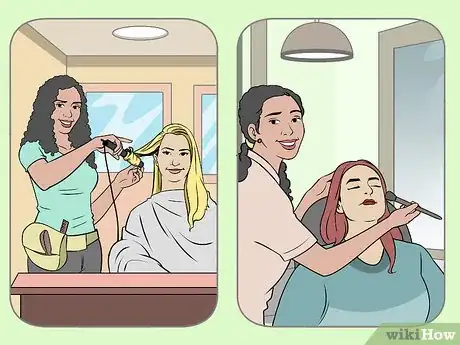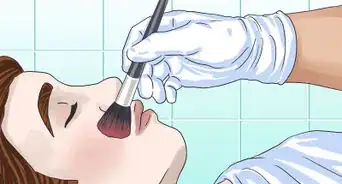This article was co-authored by Karina Villalta. Karina Villalta is a certified Esthetician and Owner of Oh Sweet and Sugar and Shears, a skincare and hair removal service located in Seattle and Kirkland, Washington. With over eight years of experience, Karina specializes in eyebrow shaping, a hair removal technique called sugaring, and organic facials. Karina started her career and was trained at Benefit Cosmetics Brow Bar. Since opening her own business, Karina ensures her clients are educated about their skin and helps them implement personalized skincare routines.
wikiHow marks an article as reader-approved once it receives enough positive feedback. In this case, 96% of readers who voted found the article helpful, earning it our reader-approved status.
This article has been viewed 269,267 times.
The cosmetologist profession is growing rapidly, and with good reason.[1] The profession is dynamic and requires great social skills and an eye for beauty. Though a cosmetologist's primary focus is often cutting, coloring, and styling hair, many cosmetologists also give manicures and pedicures, do makeup, and give skin treatments to their clients and can even offer massage services. If you want to know if you've got what it takes to be a cosmetologist, then follow these steps.
Steps
Getting the Training
-
1Meet the basic age and educational requirements. Most cosmetology programs require you to be at least 16 years of age and to have a high school diploma or a GED to enter. But every state has slightly different regulations and requirements, so before you proceed, you should check with the cosmetology boards of different states to see what you need to do.[2] In some cases, different cosmetology schools will also have stricter requirements than the states, so you'll have to look into those on an individual basis as well.
- Some high schools even allow juniors and seniors to enter vocational programs for cosmetology. These programs give students a jump start on being full cosmetologists and give them valuable hours and experience that can count toward their hours for cosmetology school.
-
2Enroll in cosmetology school.[3] Cosmetology students enroll in state licensing beauty schools, job skills beauty schools or degree granting beauty schools. Tuition and fees for cosmetology schools range from $10,000 to $20,000, depending on the courses offered, the school's location, hours of education required and the facilities and equipment available. You can enroll in cosmetology school at a private school, community college, or a for-profit cosmetology program.[4]
- Make sure that you look at at least three different schools in your area and compare the prices, the percentage of students that find jobs, and the duration of the program.
- Talk to the admissions counsellors at each school to find which school is the best fit for you.
- Some schools offer courses for part-time students or night courses so that you can get the education with a more flexible schedule. If this is important for you, it should be a priority.
Advertisement -
3Complete cosmetology school. Most schools take between 9-15 months to complete. While most states require around 1,600 training hours before you get your license, some require a lot more or less, falling in the range of 1,000 hours and 2,300 hours. You'll have to put in long hard hours and learn a variety of subjects that range from hair coloring to human anatomy. You'll have to attend class, pass exams, and get many hours of hands-on practice.[5] Here are some of the things you may have to do in school.
- Take courses that teach you about human anatomy and chemistry and how to wash, cut and style hair.
- Learn about the chemicals used in coloring, straightening and making hair curly or wavy.
- Learn how to give facials and facial massages.
- Learn about the chemicals you use when you give a client a facial chemical peel.
- Learn how to wax the different areas of your clients' bodies--including the upper lip, eyebrows, underarms, legs and pubic areas.
- Learn about microdermabrasion.
- Learn how to administer a microdermabrasion on your clients' faces.
-
4Consider specializing. Finding a specialty can also help you land a job; it typically takes about 600 extra hours of coursework to specialize. Though your job title can be "cosmetologist," there are a wide variety of specialties and job titles that you can take on after additional training. And remember that cosmetologists can also work as magazine editors or consultants or as marketing specialists, though getting some years as a cosmetologist under your belt can help you land one of these careers. Here are the variety of job titles that you can hold in this position:[6]
- Beautician
- Hairstylist
- Wedding stylist
- Barber stylist
- Nail technician
- Manager stylist
- Salon assistant
- Spa manager
-
5Pass your licensing exam. All 50 states require cosmetology graduates to take and pass a licensing examination. Licensing requirements include meeting the individual state's guidelines for licensure. Each licensing applicant has to pass written questions and practical testing in skin care, applying makeup and hair care. Applicants can earn a cosmetology, esthetician or nail technician license.[7]
- You can also get your cosmetology license and then continue to pursue other specialities.
- When you pass your exam, you'll still have to pay a licensing fee.
Landing the Job
-
1Participate in an apprenticeship program if a salon in your community offers one.[8] This is a great way to get your foot in the door and to gain more valuable experience. And if you're having trouble finding a job, this can also help you become a better applicant. To do this, you'll have to register for an apprenticeship at a local beauty salon and gain the experience for up to 2 years.
- You should still get paid for the apprenticeship, but you wouldn't get paid as much as a full cosmetologist.
-
2Find the best location for your work. Not every cosmetologist works in a beauty salon. In fact, many cosmetologists are self-employed or even work part time. This allows them more time and flexibility throughout the week. If you want to have your own practice, you'll need to put in some hours at another business first. But you have some flexibility in choosing where you can work. Here are the most common locations:
- Beauty salons and barbershops
- Day spas, hotel spas, resort spas
- Retail beauty supply locations
- Nursing and residential care homes
-
3Apply for cosmetology openings in and around your community. Applying for a position at a salon as a cosmetologist is much like applying for any other job: you'll need to write your resume, make phone calls, check which salons have openings, and leave your resumes with salons that don't have openings just in case a job opens up at a later time. You can also search for open positions online. Just remember that even if you submit a resume, it's best to follow up in person or over the phone so you are more likely to get noticed and to look serious about the position.
- As with any other profession, it helps to have connections. If you make a connection to a beauty salon during cosmetology school or know someone who works at a salon, you'll be more likely to get a job.
- If you're open to relocating, then it may benefit you to move to an area that has particularly high employment for cosmetologists. The five metropolitan areas with the highest employment for cosmetologists are Palm Coast, FL, Ocean City, NJ, Longview, WA, Mansfield, OH, and Springfield, OH.
Succeeding in Your Career
-
1Develop the skills you need to be a great cosmetologist. It's one thing to snag a job as a cosmetologist, and another to be truly excellent in your career. If you want to be a great cosmetologist, then you have to put in the hours to learn how to work with different hair and skin types. But it takes more than that. Here are some other skills you'll have to develop as you move forward in your profession:[9]
- Stellar communication skills. If you want your clients to be happy, then you have to be able to talk to them about what vision they have for their hair and skin and to know how to give them what they want (within reason).
- Great social skills. This is different from being able to talk to a client about what hairstyle she wants. You'll often have to spend more than an hour working with each client, and you'll need to know how to make small talk, make your clients feel comfortable, and even how to make them laugh. If you want your clients to keep coming back to you, you have to know how to socialize with them.
- Business and financial experience. This is crucial to have, especially if you are or are thinking about being self-employed.
- Artistic skills and ability. The more hours you put in, the better sense you'll have about what will and won't work for all of your client.
- Ability to multi-task. You will have to work with many clients in one day and will often have to use a variety of skills at any given point.
-
2Keep your skills current. If you want to succeed in your profession, then you have to keep your skills up to date and to be aware of current trends in your industry. What's popular in hair and makeup today is very different than what was popular ten -- or even five -- years ago, so it's important to know how to give your clients exactly what they want in this day and age. Here are some ways to keep your skills as current as possible:
- Attend trend shows
- Enroll in continuing education classes
- Subscribe to popular style magazines
- Read style blogs
-
3Develop a strong client base. Without your clients, your career won't add up to much. If you want to be a great cosmetologist, then you have to develop a loyal and growing client base and make sure that the people who see you want to see you again -- and again. To develop a strong base, you need to know how to talk to your clients, make them feel at home, and to let them know how much you value your business.
- Whenever you finish with a client, you have to encourage him or her to book his or her next appointment. Say, "If you want to keep up that new haircut, you'll have to come back in one month. Make sure you book an appointment."
- Ask for referrals. Your clients can also send their friends and acquaintances your way, often for a discount. This is another way to grow your client base.
- Make your clients feel important. Remember the names of their kids or husbands and ask about them the next time you see them. Show them that you don't just see dollar signs when they sit in your chair.
-
4Expand your business. Once you've gained enough experience working for someone else, you can consider opening up your own salon or beauty establishment. It'll be much easier if you build a strong client base first so you know you'll have clients in your new business, and it'll also help to make connections with other cosmetologists that you can potentially hire for your business. Though having your own business will be more work, you will reap more rewards if you succeed.
- You can also consider moving up to a managerial position at a beauty salon or a spa. This will also give you a pay bump and less hands-on work.
Community Q&A
-
QuestionDo you need to take cosmetology classes in high school to become a cosmetologist?
 Community AnswerNo. You can go to cosmetology school after high school. But if your school has cosmetology classes, it will give you head start to be a cosmetologist.
Community AnswerNo. You can go to cosmetology school after high school. But if your school has cosmetology classes, it will give you head start to be a cosmetologist. -
QuestionWhat sorts materials do I need for this?
 Community AnswerIf you register for a cosmetology class, they will usually either provide materials for you, or give you a list of what to buy and where.
Community AnswerIf you register for a cosmetology class, they will usually either provide materials for you, or give you a list of what to buy and where. -
QuestionAfter I'm licensed, can I open a salon of my own?
 Community AnswerYes. However, you will also need a business license, and you'll need to ensure that you're complying with all state regulations (as well as any regulations from the state board of cosmetology).
Community AnswerYes. However, you will also need a business license, and you'll need to ensure that you're complying with all state regulations (as well as any regulations from the state board of cosmetology).
References
- ↑ http://www.beautyschoolsdirectory.com/faq/cosmetologist.php
- ↑ http://www.beautyschoolsdirectory.com/faq/state_req.php
- ↑ Karina Villalta. Certified Esthetician. Expert Interview. 19 August 2020.
- ↑ http://www.beautyschoolsdirectory.com/faq/cosmetologist.php
- ↑ Karina Villalta. Certified Esthetician. Expert Interview. 19 August 2020.
- ↑ http://education-portal.com/articles/Cosmetology_Summary_of_Educational_Requirements_to_Become_a_Cosmetologist.html
- ↑ http://education-portal.com/articles/Cosmetology_Summary_of_Educational_Requirements_to_Become_a_Cosmetologist.html
- ↑ Karina Villalta. Certified Esthetician. Expert Interview. 19 August 2020.
- ↑ http://beautyschools.com/specialty/cosmetologist/
About This Article
To become a cosmetologist, work on your communication skills since you'll need to be able to communicate with your clients about what they're looking for. You should also practice being social and making small talk with people since you'll be talking with clients for long periods of time while they're in your chair. Also, if you don't already, start reading style magazines and blogs so you stay up-to-date on the latest hairstyles and trends. To learn about the training and licensing requirements for becoming a cosmetologist, read on!



































































